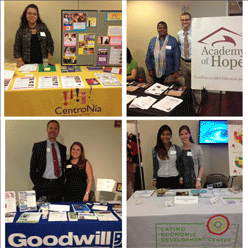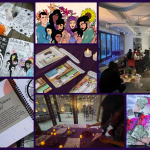 For me – as for many others – January is my “clean slate.” No, it’s not about New Year’s resolutions. For Washington Area Women’s Foundation, it’s a chance to celebrate the over $1 million in grants our board approved in December, and to exhale and plan for the work all of these Grantee Partners will be leading in our community this year.
For me – as for many others – January is my “clean slate.” No, it’s not about New Year’s resolutions. For Washington Area Women’s Foundation, it’s a chance to celebrate the over $1 million in grants our board approved in December, and to exhale and plan for the work all of these Grantee Partners will be leading in our community this year.
This year’s Grantee Partners are employing a variety of strategies to help increase the economic security of women and girls in the Washington region.
- Our workforce development Grantee Partners are providing a range of services along a continuum: adult basic education, post-secondary education and training, occupational credentials, job training programs, job placement, retention and advancement strategies. Grantee Partners are also continuing to provide intensive case management and supportive services that are critical to the success of low-income women. And they’re targeting jobs that are high-demand and high-wage, with opportunities for advancement.
- Our asset building Grantee Partners are working to help women build their collective income and assets. They’re helping women access the Earned Income Tax Credit, learn the basics of credit, savings, and how to budget, and build assets through homeownership and matched savings accounts.
- Our early care and education Grantee Partners are increasing the quality and capacity of, and access to, early care and education in the Washington region. Grantee Partners are providing professional development, training and coaching for early care and education professionals (family child care providers, child care center staff, and pre-k teachers), to improve the quality of care available for low-income children ages 0 to 5. They’re also mobilizing important advocacy efforts, to preserve and grow investments in early care and education – so that low-income children will be prepared for kindergarten, and parents can access this important work support.
Last – but not least!! – we’re very excited to have three new Grantee Partners, working to develop two-generation strategies that will serve middle school girls and their mothers. You can brush up on our issue brief here for more on the thinking behind this work. We’ll keep you updated as this new work in our community unfolds. Until then, check out all the great work we’re supporting in 2014:
Academy of Hope
To support low-income women in Washington, DC with adult basic education, as well as connections and preparation for post-secondary education or advanced career/vocational training. Funding will also support the launch of Academy of Hope Public Charter School as a resource for adult learners in the District.
AppleTree Institute for Education Innovation
To support AppleTree Institute’s increased communications and advocacy efforts in Washington, DC, aimed at defining quality early education in terms of child outcomes that result in school readiness.
Capital Area Asset Builders
To support financial education and coaching for low-income women referred through partner nonprofit programs. A cohort of these women will also have access to Individual Development Accounts (IDAs), to provide matched savings opportunities.
CASA de Maryland
To support the Women’s Workforce Initiative, which increases economic outcomes among low-income, immigrant women through industry-recognized vocational training, work readiness supports, job placement assistance, and other support services.
CentroNia
To support the CentroNía Institute’s work linking bilingual coaches with Early Head Start/Head Start teachers, center-based teachers, and parents to develop and implement evidence-based strategies for child development, language development, and second language acquisition at home and in the early childhood classroom.
College Success Foundation – District of Columbia*
To support planning for two-generation work that serves middle school aged girls and their mothers or female caregivers.
Community Tax Aid
To help low-income women increase assets by reducing tax liabilities and receiving tax credits for which they qualify, and by avoiding tax penalties, high fee preparation services and predatory products.
DC Promise Neighborhood Initiative*
To support planning for two-generation work that serves middle school aged girls and their mothers or female caregivers.
Doorways for Women and Families
To support the intensive Financial Independence Track (FIT) for women experiencing homelessness and/or domestic violence who live in shelters or transition-in-place housing programs. The program includes one-on-one financial education and employment counseling.
Fairfax Futures
To support the Neighborhood School Readiness Project, a community model that links early care and education stakeholders to elementary school administrators and teachers. The project includes outreach to families to increase awareness and activities that support school readiness and one-to-one mentoring for family child care providers implementing curriculum.
Goodwill of Greater Washington
To support job training and placement services for low-income women in the region, with a focus on hospitality and security/protective services.
Latino Economic Development Center
To support the financial capability initiative, which will provide coaching and financial tools to low-income women.
Mission: Readiness
To support a “grasstops” media, public, and policymaker education campaign to expand early learning opportunities for children in the Washington region, with particular emphasis on Northern Virginia.
Montgomery College Foundation
To support training, coaching and job opportunities within the Apartment Industry and commercial driving industries for low-income Montgomery County women.
National Black Child Development Institute
To support T.E.A.C.H. Early Childhood DC, a nationally-recognized, research-based program that improves the quality of teachers serving children birth through age five, while also supporting systemic change in the early care and education system.
Nonprofit Roundtable of Greater Washington
To support the Capital Area Foreclosure Network, a joint initiative with the Metropolitan Washington Council of Governments, that supports housing counseling agencies in the region.
Northern Virginia Community College Educational Foundation*
To support the educational attainment of low-income women in Northern Virginia, including both early care providers and mothers of young children, through the Early Childhood Education Initiative.
Northern Virginia Family Service
To support the Training Futures program, which will help low-income women complete education and training, and secure entry-level office or health care jobs.
Prince George’s Child Resource Center
To support Joining Voices, an advocacy project for Prince George’s County that empowers parents and child care providers to articulate the importance of quality child care for family stability, school readiness and economic growth.
Prince George’s Community College Foundation
To support the Women of Wisdom program, which will provide coaching and supportive services to low-income women at the college pursuing a degree or occupational credential.
So Others Might Eat (SOME)
To support the Center for Employment Training, which will prepare low-income women for careers in the health care and building maintenance industries by providing job training, basic education, career development assistance and supportive services.
The Training Source
To support Hospitality Express 4 Success, a partnership of The Training Source, Prince George’s Community College, and the Community Services Agency of the Metropolitan Washington Council, AFL-CIO, to offer training, education, job placement and retention services focused on the hospitality sector for a cohort of low-income 18-26 year old women in Prince George’s County.
Voices for Virginia’s Children
To support efforts to promote public policies and investments that ensure all children in Northern Virginia, particularly those who are disadvantaged, enter kindergarten ready to succeed.
YWCA of the National Capital Area
To support planning for two-generation work that serves middle school aged girls and their mothers or female caregivers.
Year Up National Capital Region
To support young women, ages 18-24, with education and workforce development training, including up to 18 college credits, job skills development, and a six-month internship.
Urban Alliance Foundation
To support young women in the High School Internship Program, which provides work experience, mentoring and life skills training, and is the only year-long employment program for high school seniors in Washington, DC.
* First-time Grantee Partner
Lauren is a program officer at The Women’s Foundation.



